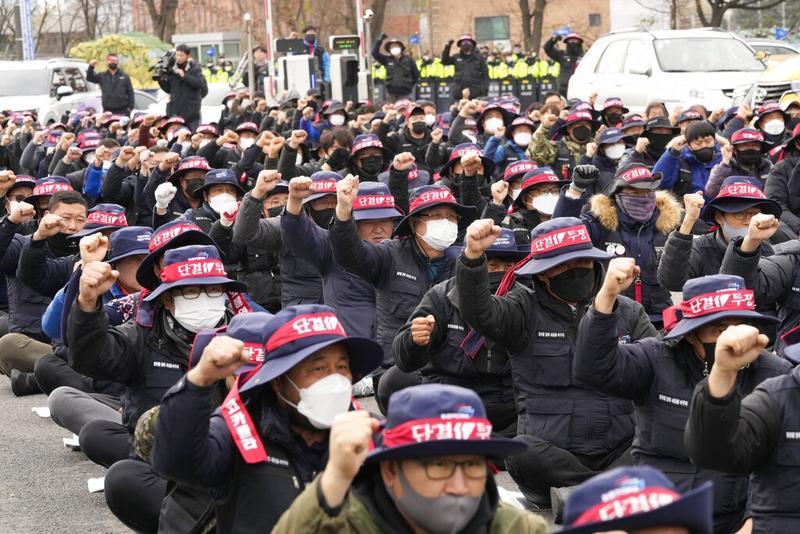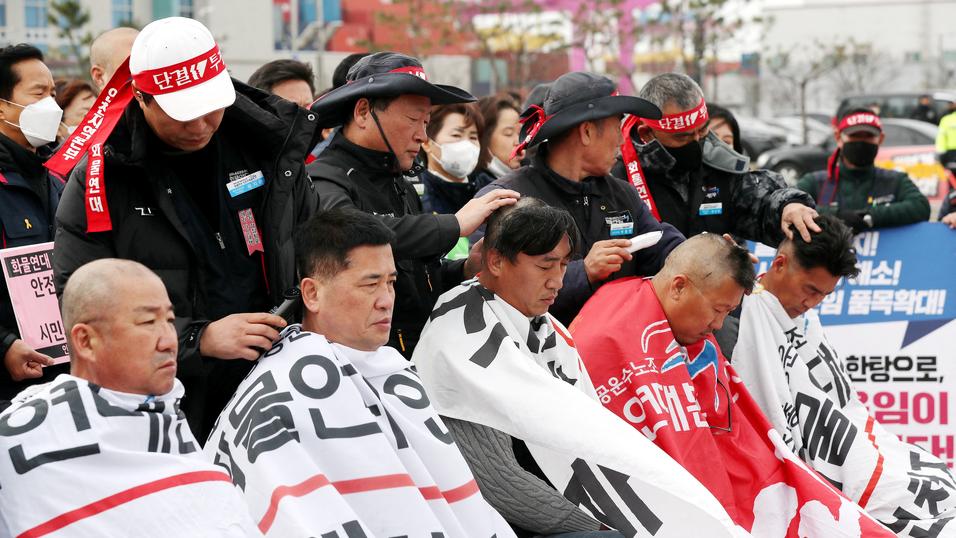 Members of the Cargo Truckers Solidarity union stage a rally against the government's return-to-work order on cement truckers in Uiwang, South Korea on Nov 29, 2022. (AHN YOUNG-JOON / AP)
Members of the Cargo Truckers Solidarity union stage a rally against the government's return-to-work order on cement truckers in Uiwang, South Korea on Nov 29, 2022. (AHN YOUNG-JOON / AP)
SEOUL - The South Korean government failed on Wednesday to reach a deal with striking truck drivers, who defied an order to return to work as concerns rose over shortages of petrol and pricier groceries inflicting further economic damage.
Transport ministry representatives said that the government would not change its position. The ruling People Power Party told the union representing the 25,000 striking drivers that they must return to work before lawmakers will deliberate a bill on demands, the union said in a statement.
It is the government and parliament that should return to work... The government and ruling party must immediately withdraw the start-work order, which took the basic rights of cargo workers hostage, and engage in sincere dialogue.
The Cargo Truckers Solidarity Union (CTSU)
Neither side set a date for the next negotiation session.
On Tuesday, the government of President Yoon Suk-yeol invoked a "start work" order on 2,500 drivers in the cement industry, requiring them to return to the road or face penalties. The drivers are in their seventh day of a strike over minimum pay rules.
"It is the government and parliament that should return to work... The government and ruling party must immediately withdraw the start-work order, which took the basic rights of cargo workers hostage, and engage in sincere dialogue," the Cargo Truckers Solidarity Union (CTSU) said.
ALSO READ: Strike: S. Korea orders truckers in cement industry back to jobs
About 7,000 people rallied in 16 regions across the country for the strike on Wednesday, according to the transport ministry.
The stoppage is the second truckers strike in less than six months, and has caused daily losses of an estimated 300 billion won ($224 million) and disrupting industrial activity in Asia's fourth-largest economy, set to slump next year.
 Unionised truck drivers have their hair shaved at a head-shaving protest to oppose President Yoon Suk-yeol issuing a back-to-work order for protesting truckers in Incheon, South Korea on Nov 29, 2022. The banner reads "A back-to-work order is illegal". (YONHAP VIA REUTERS)
Unionised truck drivers have their hair shaved at a head-shaving protest to oppose President Yoon Suk-yeol issuing a back-to-work order for protesting truckers in Incheon, South Korea on Nov 29, 2022. The banner reads "A back-to-work order is illegal". (YONHAP VIA REUTERS)
Out of 985 construction sites nationwide operated by 46 construction companies that submitted reports on Tuesday, work at 59 percent, or 577 sites, had been suspended because of a lack of supplies, the transport ministry said
As of early Wednesday, 23 petrol stations had run dry, the industry ministry said. Petrol stations nationwide had an average of about eight days of gasoline supply as they secured stock before the strike, but stations with high turnover in the Seoul metropolitan area are seeing shortages.
Out of 985 construction sites nationwide operated by 46 construction companies that submitted reports on Tuesday, work at 59 percent, or 577 sites, had been suspended because of a lack of supplies, the transport ministry said.
ALSO READ: South Korea's striking truckers say no deal reached in govt talks
'Every possible measure'
Transport Minister Won Hee-ryong told reporters on Wednesday that the government would issue start-work orders to more striking truckers in other sectors if necessary.
The government has relayed the start-work order to 350 of the cement transport workers as of Wednesday. If they do not comply, the government can suspend their transport licenses for 30 days, then revoke them
Union leaders said on Tuesday they would take legal action against such orders.
The government has relayed the start-work order to 350 of the cement transport workers as of Wednesday. If they do not comply, the government can suspend their transport licenses for 30 days, then revoke them.
Drivers may also face up to three years in jail or a fine of up to 30 million won ($22,550).
READ MORE: S. Korea transport ministry to meet with striking truckers union
The government has repeatedly expressed unwillingness to expand a minimum pay system for truckers beyond a further three years, while the union says it should be permanent and wider in scope.


